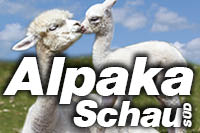Articles by Alpaca World Magazine:
A 2nd French Letter
Andy Spillane
At long last, mid November, the rains have come. Here, in south west France, it has been the hottest and driest summer since 1972, a trying time for animals, plants and man. We have been more fortunate than many others, losing just one alpaca to the heat. This, despite our best efforts to provide plentiful water, shade, for all, and to revive and keep her alive in particular. She left behind a two month old cria , Chico.
With much trepidation we started bottle feeding Chico. Mindful of all we had read about ‘alpaca rage’, we kept the bottle at arms length and resisted the urge to pet or handle him in any way. Luckily his half sister, his mothers previous cria, adopted him. We had noticed before the strong family ties within groups of alpaca, but had not expected anything like this to happen. Although, as a maiden, Beige cannot suckle Chico she has, in all other respects, taken on the role of mother. She stands with her neck over his back while he takes the bottle and hums to him. If another alpaca approaches whilst suckling she promptly spits them off. When he has finished his bottle she immediately leads him away from us. At night she kushes with her head and neck above his back and if danger threatens during the day he rushes to her side. He is now fully weaned and just another playful young male in the herd.
“ Where should I buy my alpacas, in France or UK?”. This is a question we are frequently asked, especially from aspiring first time alpaca buyers. Three years or so ago the answer was simple, “UK”. At that time the choice in France was very limited and generally, though not in all cases, of poor quality. Many of the herds had been founded with unwanted Zoo stock or bought more on price than quality considerations.
Nowadays, the answer requires a little more thought. Three years ago the alpaca landscape changed in France with the import of three hundred and sixty animals direct from South America. Whilst some were sold on to Holland and Germany the majority remained in France. Also, during these years many French, Dutch and English breeders resident in France have imported high quality studs and females from many of the leading breeders in the UK and Germany.
For the buyer wishing to start a large commercial herd of top quality alpacas the answer remains the same, the UK or perhaps direct from South America. The choice, quality and quantity of alpacas on offer far exceeds what France has to offer at the present time.
For the smaller herd or pet buyer the answer is less straight forward. The choice and quality, whilst not in the UK league, has greatly improved. The national herd increased by about 50% last year and this trend is predicted to continue. This year has seen the importation of more than a dozen quality stud males so far. As with the UK in comparison with the USA, lower demand means lower prices. On average, similar quality animals cost appreciably less when bought in France.
A number of other factors need to be taken into consideration in addition to the simple choice/quality equation. Many potential buyers are purchasing livestock for the first time and are more than a little apprehensive at the prospect. Initial training and ongoing support is often regarded as essential. In both these areas local knowledge, of the specific animals, the local laws, climatic conditions and so on is a major advantage and help to the first time buyer. Whilst distance is less of a consideration in communications with phone, fax and e-mail available to all, sometimes there is no substitute for a face to face discussion or hands on assistance.
Another consideration is distance and transportation. With the simplification of the quarantine regulations this is no longer a problem when purchasing animals, apart from the expense. The expense is also not excessive if it means having the particular animals that fill your requirements. It can become so at a later date if problems arise. There have been two recent cases each involving three females purchased as in cria. These animals, purchased by different buyers from different breeders, failed to produce cria after 12 months. This may of happened for any number of reasons, not least the possibility of re-absorbtion by the females on the long journey. In both cases the buyers called on the sellers for support and assistance. In one case the seller arranged re-matings for the three females in France at no cost to the buyer. In the second case, after much procrastination, the seller simply stated they would honour their sales contract, ie – return the animals to their UK farm and have a free re-mating. An expensive and time consuming option for the disappointed buyer. A particularly bad case involved a large shipment. After several months of delay the animals were finally shipped to France. On arrival they were found to have been totally neglected in the intervening period, many were in a very poor condition and one so bad, even after extensive veterinary treatment, it had to be destroyed. The very distressed buyer was left with a 3000€ vets bill for his herd and a long and bitter battle for compensation.
It has to be said the above cases are the rare exception. Equally these types of problem can sometimes occur in France. They are usually quicker and easier to resolve, however, if you can drive down the road and confront the seller with the problem personally. Our own initial experiences with importing were trouble free and the UK breeders were of great and continuing help. Perhaps the best answer to the question of where to buy for the first time buyer is as follows. Do some thorough research and get to know the breeders and then buy from someone you feel you can trust and can supply the level of support you might need, whether they be in the UK or in France.
Tweet



